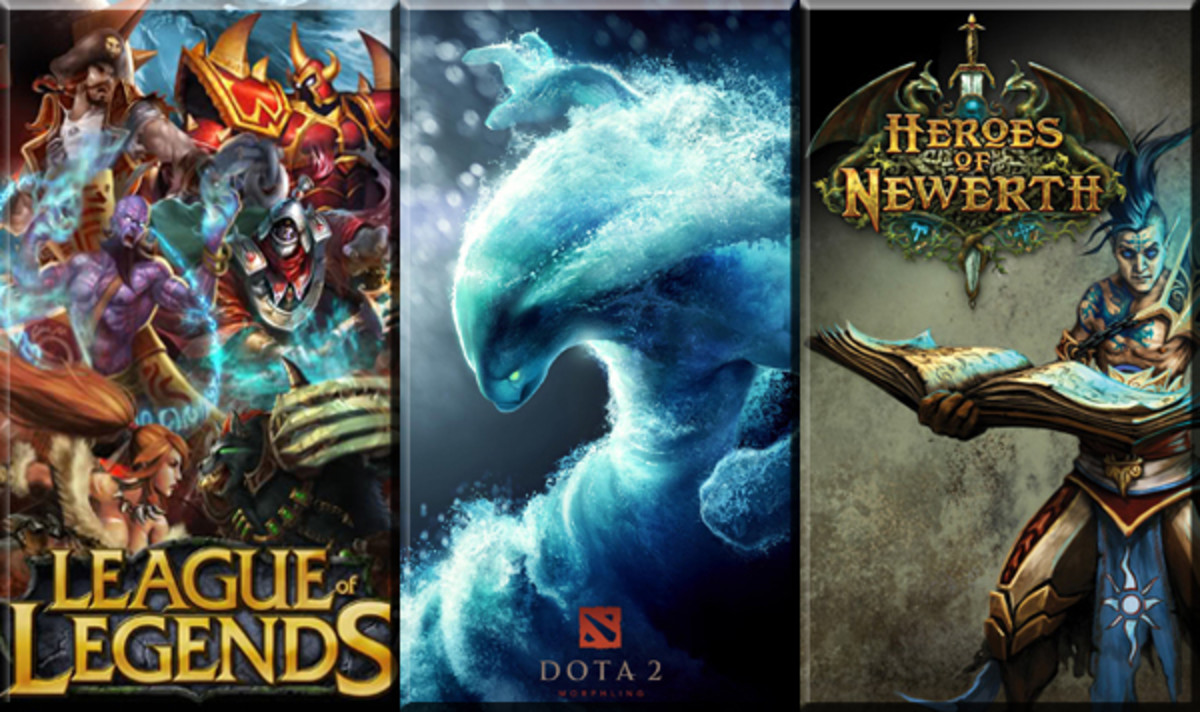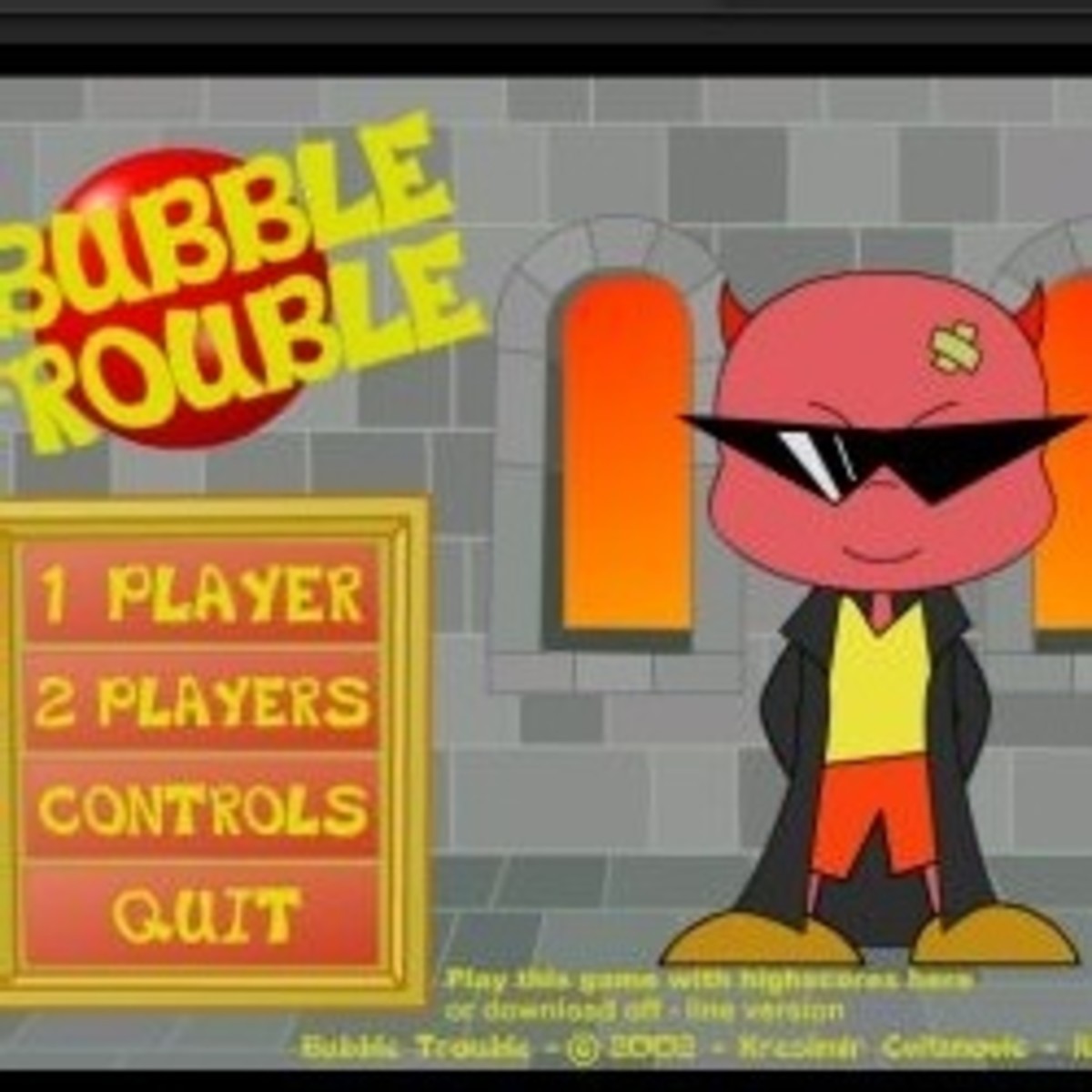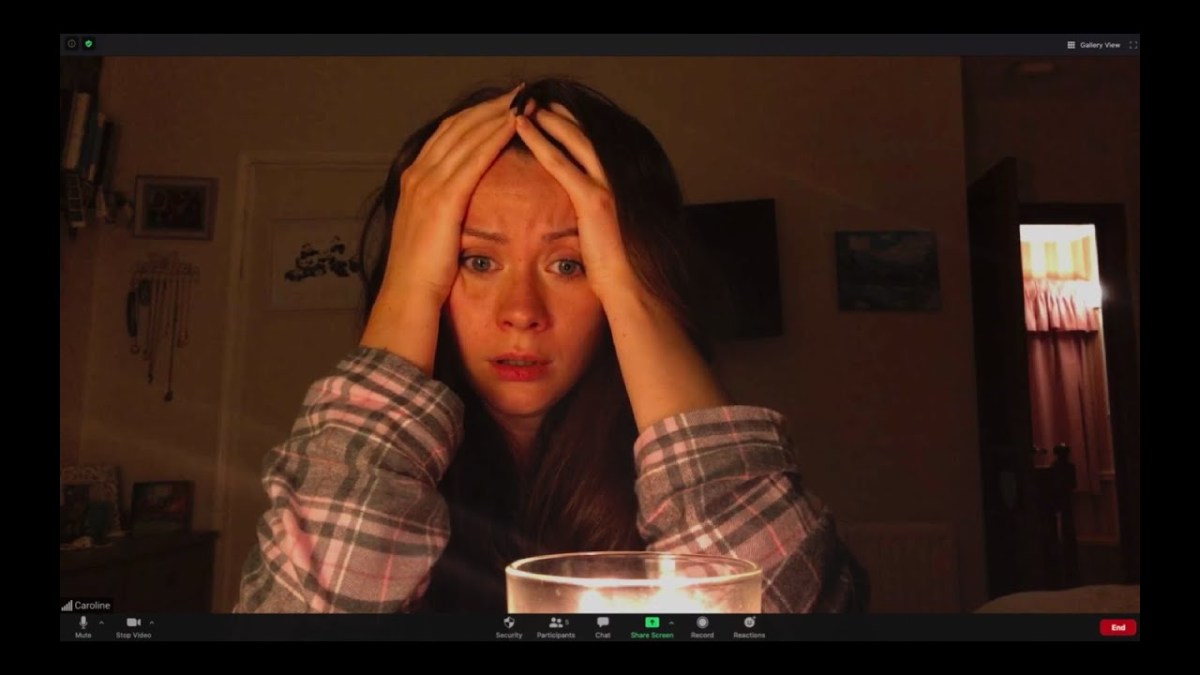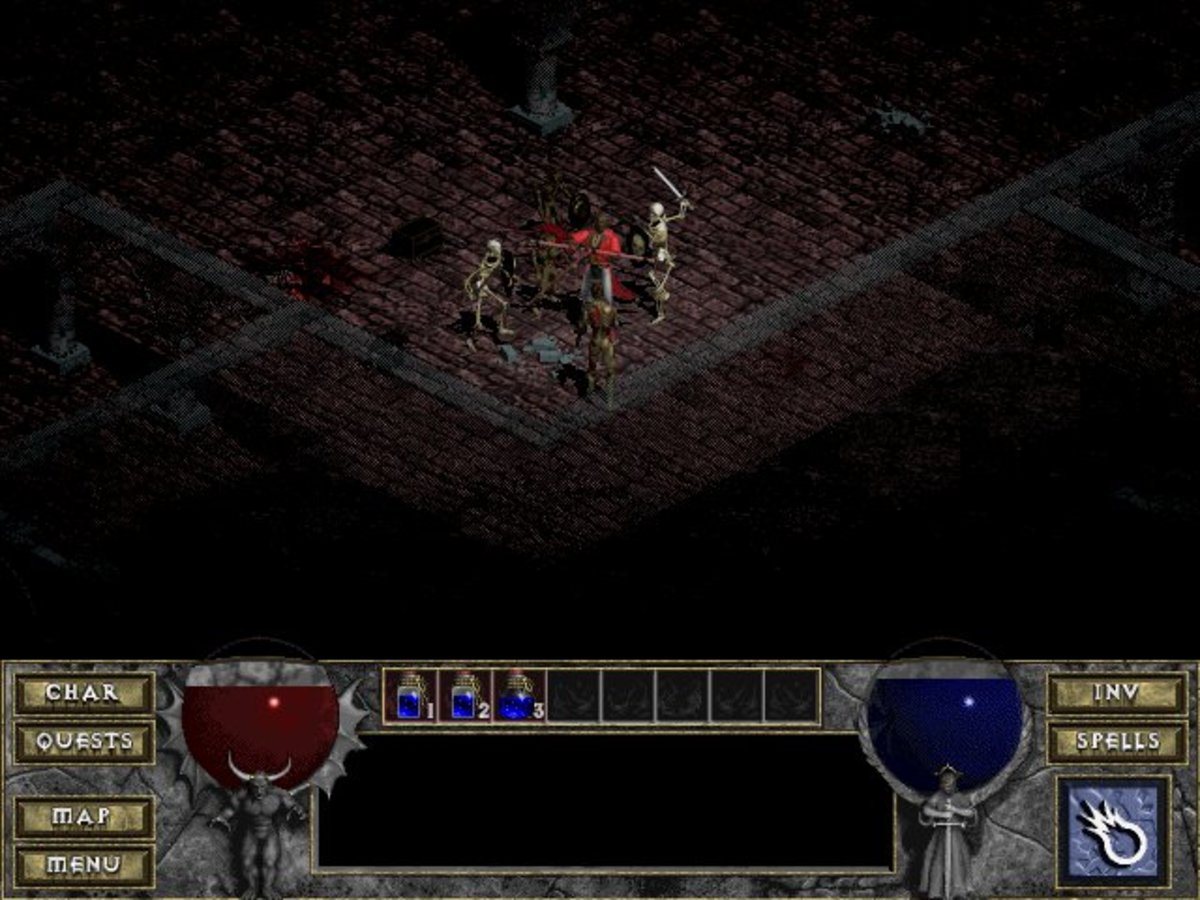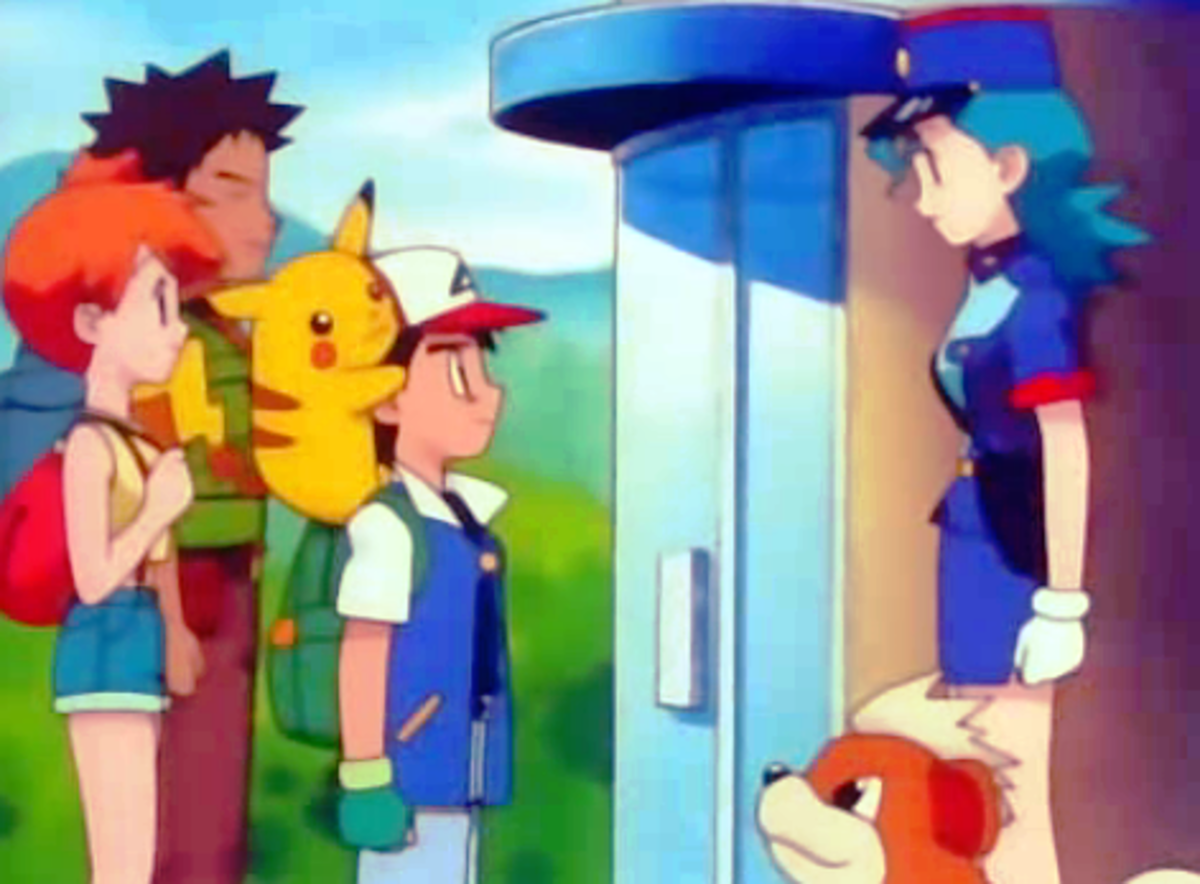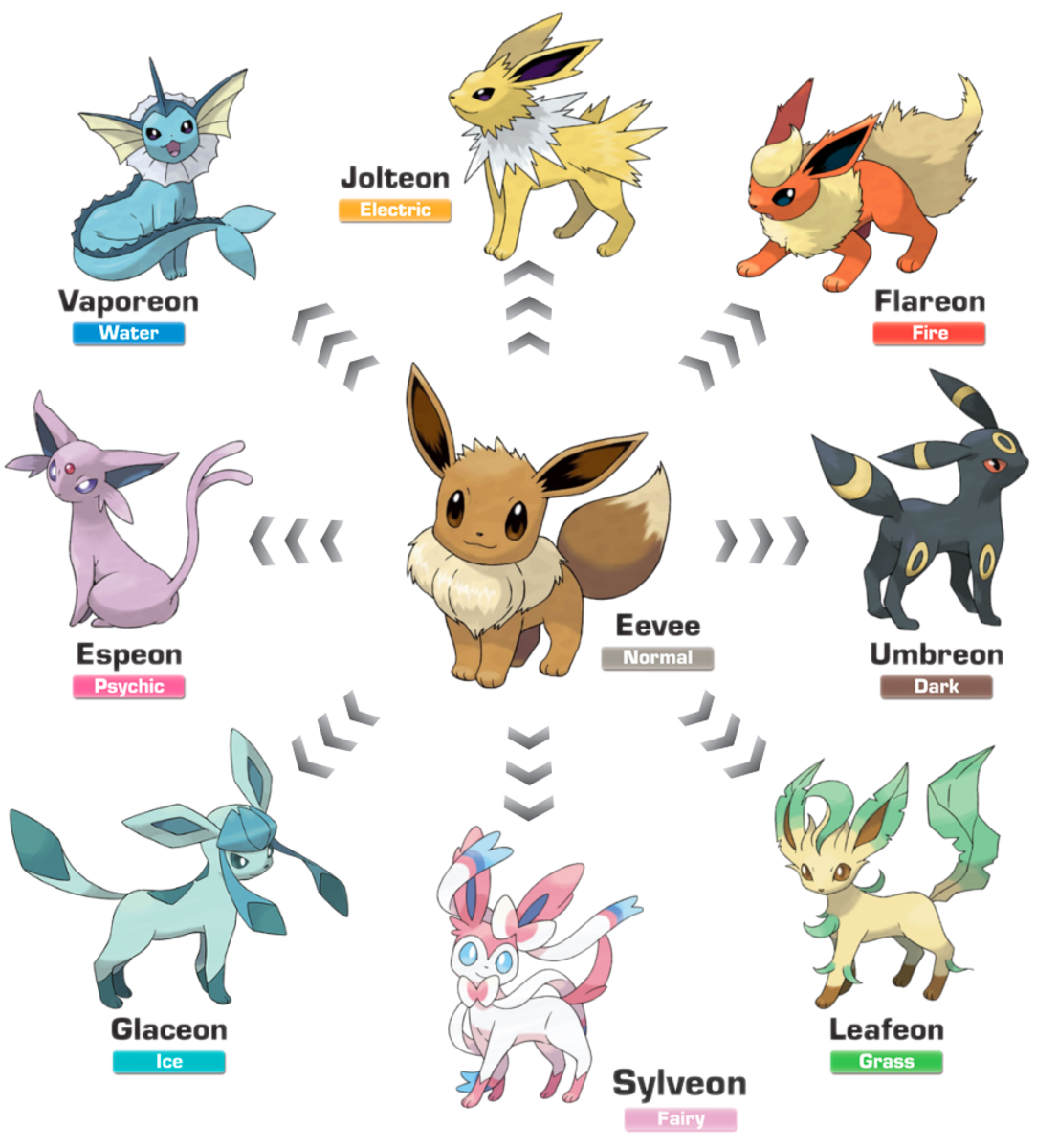- HubPages»
- Games, Toys, and Hobbies»
- Computer & Video Games»
- Roleplaying Video Games
Phantasy Star Online, Episode 1 & 2: A Retrospective Review
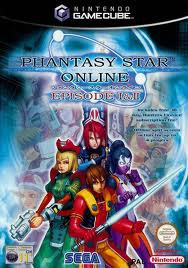
About the Author
John Roberts is a video game critic on HubPages and YouTube, reviewing that he sees worthy of the former, whilst reviewing Playstation One games on the latter channel. When not making articles based on nostalgia, made up intimate knowledge and 'things he heard somewhere', he acts as an information broker to the world's most important people for huge sums of cash.
The last time Roberts rode on a star ship, slain a plethora of never-before-seen creatures and bought a levitating Dreamcast to follow him around, he was arrested after being caught high on marijuana. Given a £50 fine and a slap on the wrist, he went home dancing with half-naked cat people in a wooden shack, which later turned out to be a good trip on Skooma.
Return to Pioneer 2
As this is my third retrospective review in two years of being on HubPages (there shall be more in future), I think you know the score by now. This is not only my most expansive and detailed kind of review, it's also one that holds a lot of personal ties and glazed in nostalgia. That's not to say that I will be unfair with this game and review it out of how I remember it oh-so-many years ago as I will cover the negatives (and this game has a fair few) in great detail as well. For me my experiences of this game began not long after it's European release, when a friend had recently borrowed the game from his uncle, who is also a gaming enthusiast. It seemed very different to the games we were used to, which were mostly platformers but we still took a lot of joy in playing the Playstation 1's Hogs of War and Crash Bash at the time, both good games when played with friends. I think an important question to ask during this review is "what games aren't fun with friends?", and that shall be looked into further down the line.
I remember being enthralled by this title the moment I saw it on my friend Oliver's telly though; the environments were huge; the monsters were lacking polygons but still very scary; the fighting animations were gorgeous and the soundtrack was the mere whisper of composing legends. When offered to play it on a low-level character, I was surprised by how easy it was to get into. The controls were easy to understand and there wasn't very much I needed to learn, plus in multiplayer I had a helping hand levelling up and killing creatures. This was the first RPG I'd ever played and couldn't wait to see what else the genre had in store for me.
Phantasy Star Online: Episode 1 and 2 was my first proper roleplaying game experience and with friends it was the only time where multiplayer was an emotional joyride. Communication, strategy and heroism were all there and things we hadn't seen in games before this. At the time MMORPGs were minimal, and those that were around were taking their baby steps into the future. No game required such team-play, reliance on pre-programmed phrases and there were still no MMOs that made character creation a bonding experience after a few hours into the game.
History and Development
History
But Phantasy Star goes back far beyond the Gamecube and Xbox, the former of which I will be reviewing (there are some major differences which I will get round to). The game of the series' same name goes back to 1988 on the Sega Master System, revolutionising roleplay at the time in various ways. Often cited as the first game to have a female protagonist, one of the few games that had enough disc space to contain a story and huge advancements in visuals, Phantasy Star was a game changer at its time, and even Online has a few innovations which MMO developers could learn from in this day and age. The game's plot can easily be compared to the older Ultima titles, about a king who becomes a cruel dictator thanks to changes in religious beliefs and conflicts with philosophies, as well as giving into guilty pleasures. It may seem generic but there is a lot of depth if you're willing to follow the story right to the end, as well as one of the largest universes in video games at the time (a solar system consisting of 3 planets, all of which you go to). Not only did it change RPGs in terms of lore but also gameplay. It was a pioneer with its combat, based mostly in first person and added all kinds of innovations to what we know as "traditional" RPG combat (turn-based). Plus, it was the first game where you could attempt to talk with enemies in combat, but only a minority of them were able to communicate with her.
Phantasy Star II and III are the most commonly known ones because they saw the most ports and were the cheapest (the first game could cost up to 80 USD!). The PS2's generation of gamers would see these ports quite a few times and even though they were successful, the boom of Final Fantasy's popularity overshadowed the Phantasy Star releases.
Development
Phantasy Star Online was conceived almost immediately after the release of Sonic Adventure, where the chairman of gaming giant Sega wanted to change the gaming world. Isao Okawa realised the importance and influence of the internet, and found within it a phenomenon - it could be a way to play video games as well. He wasn't the first to think this but he took a very large risk, especially seeing as the Dreamcast already had rocky reviews, and didn't want to harm his already crumbling colossus any further. Originally calling it The Third World, the lead artist for the game produced a mood piece for the game which combined fantasy and science-fiction, which in turn made Okawa link the game to the titanic Phantasy Star series. And I don't know what would've been more exciting - the development of the game or its release and critical success.
But being the gambler Okawa was, he wanted to make drastic changes that could in turn lead to the last of Sega's crutches being kicked away from them. Instead of going with a traditional RPG, he took elements from Blizzard Entertainment's Diablo games, which were extremely popular for PC gamers at the time. But rather than clone their success, he decided to alter them to the point where Diablo is the last game you'd think this game 'copies'. He made a universe comparable to Blade Runner; he made beings comparable to Star Wars and Final Fantasy; he made the combat a unique blend of Diablo and what most MMORPGs are doing today. And if I may say so, he had created one of the finest RPGs with so little influence.
Future Ports
It would be another 2 years before PSO would see its port on the next generation of consoles, the Xbox and the Gamecube. It's very easy to mistake Phantasy Star Online: Episode 1 and 2 for Phantasy Star Online Version 2 (on the Dreamcast), but the two are hugely different. For starters, the port to the original Xbox and Gamecube would feature a whole new episode, continuing the story of Pioneer 2's troubles and successes in attempting to take natural worlds' resources and colonise them, amongst other things. With this episode there are more quests, more bosses, more items and as a bonus, the Dreamcast MAG (which augments characters and their abilities). But where the ports differ is functionalities.
Should you plan on buying this game, DO NOT get the Xbox version! The reason is because to even pass the title screen you need to have an Xbox Live account, which you can no longer do because the service on the original Xbox is no longer available. On the Gamecube however you don't have to make a Hunter's License for online play, but you can still play offline. No XBL account, no offline mode. This is crucial to those who want to buy this game and play it rather than keep it as a collector's item, which no matter the port, still is.
Where Xbox does succeed though is its online community. The number of Xbox players at the time was far greater because Microsoft made sure their console had online functionality for a number of their games. It was proven by this console that multiplayer across the internet was the way forward and changed console MMOs for the better. But Nintendo didn't really care for it, even though they'd seen that online multiplayer was becoming a huge thing. They had to release a peripheral just to cater to around 5 games with online play, but even then, Phantasy Star Online was more popular online with the Xbox.
"And let me tell you, these lumbering vats of dripping don't half hurt."
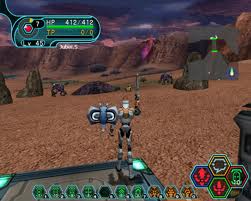
Lift Off
After constant battles on their homeworld of Coral, the armies agree that their planet is no longer habitable, and so they unite to form the Alliance of Nations. Finding this partnership much better than endless warring, they decide to work together on new space-faring vessels that must find new planets to survive on. Knowing the effects of war, it has to be a land that is worth protecting rather than fighting and dying for. In Episode 1, the first ship known as Pioneer 1 lands on the planet Ragol which is filled with clean water, food sources, vegetation and natural conditions for humans, Newmans and CASTs to survive in. But when Pioneer 2 approaches the newfound planet, a devastating explosion destroys the surface, and the Hunters (that's you!) are sent down to investigate. At the end of this campaign players would be expected to make another character and start all over again on the Dreamcast, but on the port Episode 2 continues where the first left off!
Even though I only summarised the story in the above paragraph, there is so much going on and boss battles open up so much more lore! You may think that after getting lost in some underground caverns that things aren't going anywhere, but when you destroy a boss and return to the leader of Pioneer 2, you realise just how much your actions are taking effect. It's sad though because most of the changes to the story and people's reactions are through text rather than in-game cinematic sequences. I reckon these would've worked too, as the game runs very smoothly at 30 frames per second and much greater when in dialogue (jumping up to a good fifty FPS). Sadly cutscenes are limited to bosses appearing and bosses dying.
The first place you'll start off is in Pioneer 2 which is an extremely large hub for players to get started. As said in my Amazon review of the game, PSO's Pioneer 2 is like the first 10 minutes of the film Judge Dredd (yes, the one where Stallone goes "AH YAM, THUR LAWWER!"), and the element of a cyberpunk/dystopian future city is captured perfectly. It's a shame that you can't go beyond the small spaces you're confined to, but I suppose having everything you need in one space is better than having it thrown about and being tied down with the silly jog you run around with, which is plain awful for Newmans. In this city you have a hospital, shops of many kinds, a bank, the level select portal and the Hunter's Guild, each of these you will see a lot throughout your campaign. The best part is that there's no landfill here, and every building and NPC has its purpose. Sure, a lot of characters will give you the average Twitter post like "I want a new #phaser" and the like, but many will give reactions to your latest missions. It's nice to have beaten the fourth level boss to find that someone heard rumours of a lone Hunter defeating a gigantic dragon! Little things like these make RPGs so much more believable. And there's no shops that you can go into where you can't be served, so you can always go around Pioneer 2 without feeling the risk of something being a complete waste of time. Each of the shops update their stock according to your level and will ocassionally have incredibly rare items for a short time. This makes the single player mode feel so much more alive and doesn't make you feel so miserable and lonely. It's like somewhere out there other players are manipulating the market, selling off epic guns that to them are just vendor trash. You might not experience that yourself, but when you've played with people who are about 60 levels above your own in local multiplayer, you can't help but wonder.
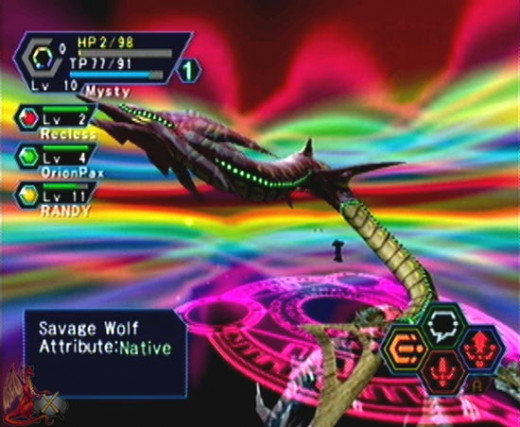
Before you even get to Pioneer 2 you have to create your character and this is something that wows me even today. Most MMORPGs fail to give characters distinctive features, which make your character just that, and nobody else's. This is something games like World of Warcraft fail to do and it's such an minor thing to amend. In this game you can change any race's height, weight, eye colour, skin colour, ear and nose size, face type, hair style, hair colour and clothing in a single menu, and it's so intuitive. I love playing as overly tall humans, towering over people in oddly bright clothing, or fat stumpy Newmans, the game's elven archetype. Most of all I have a passion for creating enormous blocky CASTs, which are the robot type creatures of the game who excel in ranged attacks. Out of these three races you'll find a lot of differences to health, physical and magical damage as well as resistances, but really you should go for the most visually appealing characters rather than the least statistically appalling. Once you've made your unique character it's time to choose your class, and this is where things really kick off.
Hunters (HU) are the melee fighters who use sabres (yes, light sabres are common in this game), partisans staves and twin-daggers. These are best for experienced players because they take damage fairly easily in close combat at lower levels, but can cut down foes with minimal effort. Rangers (RA) are self explanatory ranged weapon users, who prefer pistols and rifles and shotguns over melee attacks. The best choice for beginners because they can kite enemies and easily retreat when surrounded. Finally there are Force (FO) users, who excel in the use of healing and damaging magics. They use mana as a resource and this allows them to use magic spells, but they can also cast generic magic bolts (the type of magic changes depending on the weapon) from wands and staves. While they are a ranged class, their resource puts limits how well they perform alone, so are best levelled in a group for the first few hours.
The first levels of the game give you a brief understanding of what kind of resistance you'll face, what you'll find in the environments and how you'll need to navigate them. The first level, simply titled 'Forest 1' (expect this kind of originality in later levels) is where everything kicks off, and it doesn't take long for you to realise how boring combat can be as well as how difficult it can quickly become. For your first mission you're joined by a much higher level Hunter who has exceptional armour and weapons, so your troubles will be minimal the first time you go there. But in future you'll be alone, and I hate being alone in video games.
Each level is packed with mobs, doors and treasure, all of which are often linked to each other. Most doors will be locked until you find the matching colour key card (remind you of DooM?) or until you clear the screen of mobs. This is where the Diablo comparisons come in - you walk through a door, you strategize, terrorise and mobilize until the enemies are dead. In multiplayer chances are you'll do all the work while a friend runs off to loot all the crates, and I'm sure the two roles will swap like it's a game of leapfrog. It may sound boring but by utilising different attacks and doing little things like moving, and you may see for yourself how tense these fights can become.
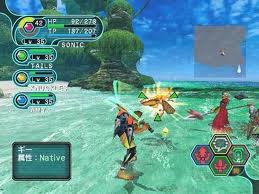
In your travels you'll come across a load of crates and even though you may think "the less people, the more loot for me", it doesn't entirely work like that in this game. In PSO I've found that with friends you're more likely to divide loot evenly as well as simply give away items that may be upgrades for your allies. This makes perfect the bonding experiences and cooperation that most MMOs have now - there's few times in World of Warcraft where I've encountered players so willing to give away things that they could vendor for something like 20 silver or gold. And what's even stranger is that the loot system doesn't automatically divide all Meseta (the currency players use in-game) amongst the party like in other games. I guess because it's not needed? Anyway, there is a lot of loot but it will be mixed up considerably. It's better to be in a party with one person of each class because you'll have less to carry in your backpack until the end of the journey, as there will be lots of items your party can benefit from. Plus the Pioneer 2 market will change depending on your group's levels, so you may be granted a bit of Meseta to boost your DPS if you point out an upgrade that dwarfs your current weapon's stats.
Loot isn't just weapons and armour though but items. Monomate, Dimate and Trimate are the healing items of the game and in order of rarity. Monomate is key for every low level player's survival and even at higher levels you may benefit from having some rations of it. Even Force users with healing magics will still need to rely on these consumables if they don't want to waste mana. Antimate removes magical, poison and disease effects from the player like a cure-all pill from 1800s Cockney London and even though it may seem useless in most games, in PSO you will need to stock up on them unless you have some healing magic. If you don't, you may die from the effects. There's other pickups that can help such as scrap that can be used to craft items and quest items for later missions. Have a look at this list from PSO-World for all the useful items that you can pick up in your journeys - again, it may not seem like much but they can play important roles in your survival. This is one of those RPGs where if you go adventuring, you need to be kitted out properly.
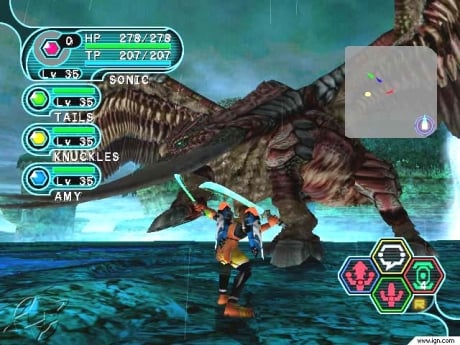
Speaking of being kitted out properly, one of Phantasy Star Online's stronger-weaker suits (your mileage may vary) is the emphasis on replaying older levels to gear up and level up. You may have killed the mobs of the first four levels and think it's onto the boss, but you're far from ready without strong weapons, a lot of healing items (plus a Scape Doll or two handy) and your MAG's photon ability fully charged too. The dragon you face at the beginning is only a shadow of what later bosses would be like, requiring reading up on tactics as well as experimenting with trial and error. The first boss however mostly spends his time airborne and occasionally comes down to melee attack and recuperate, but it's not easy taking this beast down single-handedly. While the element of strategy and teamplay is crucial in multiplayer mode (mobs and bosses scale with group size, albeit not very well), doing things alone will require higher stats with weapons and MAGs than strategy and mobility.
And even if you beat the final boss, take all the loot for yourself and get back to the lobby to vendor all your rubbish, you still have to do it a few more times to get the best experience points and loot. The next set of levels, 'Cave 1 & 2' don't get easier with the new kit you've got; they just give you a fighting chance. I hated this - despite killing the first boss around three times I was still 'lightly prepared' for the enemies ahead. It's like as though you have to be an inappropriate level to continue through the game. Scaling is so bad in this game, but if you like a challenge, gimp yourself by only killing the game's first boss and heading straight into the caves. I dare you.
I know I constantly reference the first boss and admittedly it's because that's as far as I'd ever gotten. There was some weird sewer snake which I managed to beat but that was just by a hair; each of his attacks made me thankful that I'd bound dimate to a button somewhere, and I didn't know when I was about to face him, so jumping on the boat without knowing what would happen was scary. The bosses are far and few between so you have plenty of things to do to prepare, but you just don't know when they're going to appear without a friend telling you, "don't step into that portal yet - boss portal".
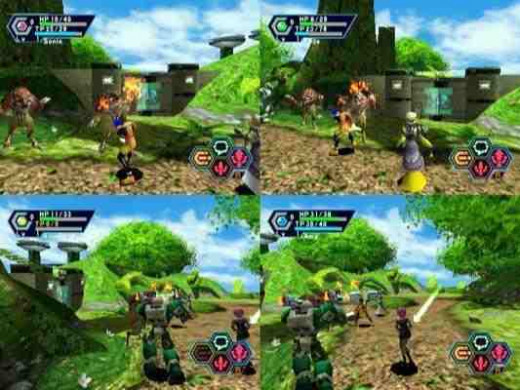
It's almost scary to progress in Phantasy Star Online because of how difficult the game can get. But it's not just that which makes me give it a horror label. It's also a very atmospheric game and in single player the sense of loneliness looms over you always. The very first fights as a Hunter made me fearful of melee attacks because of how dangerous the enemies were, and if you mashed buttons you wouldn't make combos, thus leaving you open to attack. And let me tell you, these lumbering vats of dripping don't half hurt. Add to this poor camera controls and you'll be screaming for your the Racoon City police department trying to find an exit, which should be in plain sight. In moments of panic it's easy to break the left analogue stick in vain trying to escape the nightmarish settings. Everything is cavernous, dark and dingy, and the haunting music doesn't help with low confidence issues. Phantasy Star Online isn't scared of the consequences of trapping players in dimly lit rooms to fend for their lives against very slow moving mutants.
But despite this the visual quality is hardly anything to be wowed by, except for the lush worlds of Forest 1 and 2 (I can't credit them well enough). After all, this is only a port of the 32-bit Dreamcast which didn't have that many visually impressive titles at the time, let alone now. The argument 'graphics aren't everything' remains true but the enemy animations are blocky and it seems only friendly NPCs look physically well. I can't complain as the game runs smoothly at a great 30-50 FPS on average, but do note some emulators of either version of the game will cause extreme lag and severe frame rate issues. Moving swiftly onto the soundtrack, it's great, but sadly not memorable. It works well in-game as atmospheric ambience but only Pioneer 2's theme and a few shops' music will have you tapping your feet to or humming out of habit.
Captain John, Signing Out
Much like any of my retrospective reviews, past or future, I cannot be articulate. I cannot truly say what I love about this game, how much so and why. There's always a big blob of nothingness that fills my conscience, and it simply can't be applied to these reviews. There's so much I've talked about and yet so little can be gained from my experiences. But by playing it you might be able to see for yourself the genius of such a game, and perhaps video game developers can learn from what it did well rather than what it didn't.
Going back to the question I asked earlier, "what games aren't fun with friends?". Phantasy Star Online gives players the opportunities to do anything they can in the single-player campaign and most importantly have fun with it. You're not grouping up for the sake of it but because you want to know these people and go on adventures with them. And I think that's the important thing - adventure. If a game isn't an epic adventure and nothing is to be gained from it, chances are friendships will be lost to the lonely sands of video game history. Even if there's no goal in sight for the band of brothers that go together through Phantasy Star Online's mysterious universe, they will find something. And even if there is no Meseta or weapons or quest items, they have each other. They don't work together to bring down a threat that will reward them massively in defeat, but because the reward is being together to down the threat. And in the case of this game, anything beats going it alone.
Until the next time, I'm John Roberts and I thank you for reading, and I wish you all a pleasant day. Oh, and do leave your comments in the section below - I'd love to know your thoughts!


